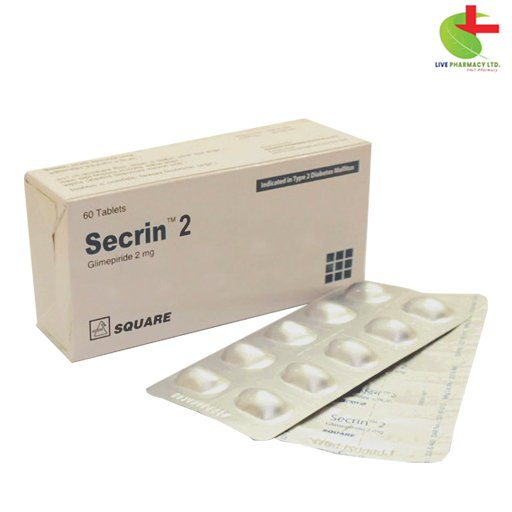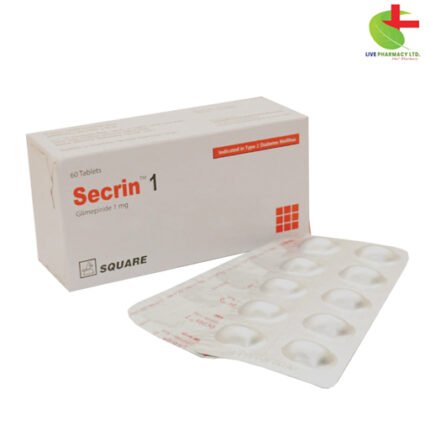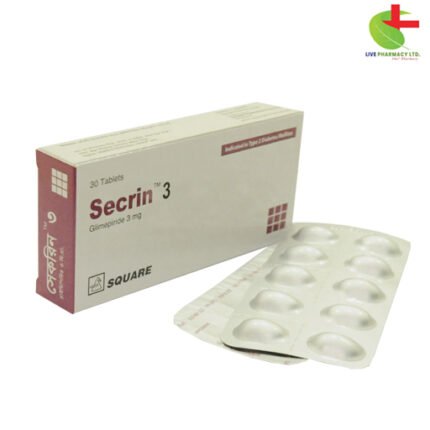Secrin 2
100.00৳ Strip
- Secrin is a medication designed to lower blood glucose levels in Type II diabetes mellitus patients.
- It complements diet and exercise regimes, aiding in glycemic control when lifestyle modifications alone are inadequate.
- Secrin’s active ingredient, Glimepiride, stimulates insulin release from pancreatic beta cells, facilitating glucose uptake by tissues.
- Close monitoring and gradual dosage adjustments are key to optimizing treatment efficacy while minimizing the risk of hypoglycemia.
 Brand
Brand
|
Square Pharmaceuticals PLC |
|---|---|
 Generics
Generics
|
Glimepiride |
Indications
Secrin is indicated in the following conditions: Secrin serves as an adjunct to diet and exercise, aiding in the reduction of blood glucose levels in patients with noninsulin-dependent (Type II) diabetes mellitus (NIDDM) whose hyperglycemia remains uncontrolled by diet and exercise alone. Secrin may be used concurrently with metformin when diet, exercise, and Secrin or metformin alone do not achieve adequate glycemic control. Additionally, Secrin is indicated for use in combination with insulin to lower blood glucose in patients whose hyperglycemia cannot be managed by diet and exercise in conjunction with an oral hypoglycemic agent. The combined use of Secrin and insulin may increase the potential for hypoglycemia.
Pharmacology
Glimepiride, a sulfonylurea antidiabetic agent, reduces blood glucose concentration primarily by stimulating insulin release from functional pancreatic beta cells. Glimepiride’s mechanism of action involves improving beta cell sensitivity to physiological glucose stimulus, enhancing insulin secretion. Furthermore, extrapancreatic effects such as reduced basal hepatic glucose production, increased peripheral tissue sensitivity to insulin, and glucose uptake may contribute to Glimepiride’s activity. In non-fasting diabetic patients, the hypoglycemic effect of a single dose of Glimepiride can persist for 24 hours.
Dosage
The dosage of Glimepiride should be adjusted to achieve the desired blood sugar level while minimizing the risk of hypoglycemia. Initial and maintenance doses are determined based on regular monitoring of blood and urine glucose levels. Dose adjustments should be gradual and guided by the patient’s response to treatment. The typical initial dose is 1 mg once daily, which can be increased as needed at intervals of 1 to 2 weeks. Patients with well-controlled diabetes typically require daily doses ranging from 1 to 4 mg. The timing and distribution of doses should be individualized according to the patient’s lifestyle and meal patterns. As diabetes control improves, dose adjustments may be necessary to prevent hypoglycemia, especially with changes in weight or lifestyle.
Administration
Glimepiride tablets should be swallowed whole with an adequate amount of liquid, following the guidance of a healthcare professional.
Interaction
Secrin may interact with various drugs, potentiating or attenuating its hypoglycemic effects. ACE inhibitors, chloramphenicol, fluconazole, and other medications can enhance the hypoglycemic action of Secrin, while acetazolamide, corticosteroids, and certain antihypertensive agents may weaken its effects. Close monitoring and adjustment of dosage may be necessary when combining Secrin with other medications.
Contraindications
Secrin is contraindicated in patients with insulin-dependent (Type I) diabetes mellitus, diabetic ketoacidosis, or diabetic coma. It should not be used in patients hypersensitive to Glimepiride or other sulfonylureas, those with severe hepatic or renal dysfunction, or patients undergoing dialysis.
Side Effects
Common side effects of Secrin include hypoglycemia, temporary visual impairment, gastrointestinal symptoms such as nausea and diarrhea, and a decrease in blood pressure. These should be reported to a healthcare provider if experienced.
Pregnancy & Lactation
Secrin is not recommended during pregnancy, and a switch to insulin therapy is advised. Breastfeeding mothers should also avoid Secrin due to potential harm to the child. Consultation with a healthcare provider is essential for patients planning pregnancy or breastfeeding.
Precautions & Warnings
Close monitoring for hypoglycemia is necessary, especially during the initial weeks of treatment. Prompt treatment with carbohydrates is recommended to manage hypoglycemic episodes.
Overdose Effects
Overdose of Secrin can lead to hypoglycemia, which should be treated promptly. Mild symptoms can be managed with oral glucose, while severe cases may require hospitalization and intravenous glucose administration.
Therapeutic Class
Secrin belongs to the therapeutic class of sulfonylureas.
Storage Conditions
Store Secrin below 30°C, away from light, and out of reach of children.













Reviews
There are no reviews yet.